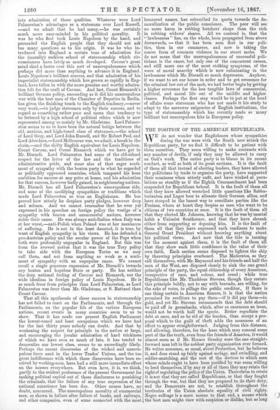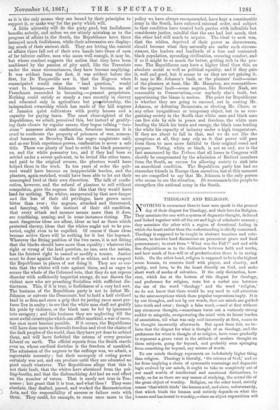THE POSITION OF THE AMERICAN REPUBLICANS.
WE do not wonder that Englishmen whose sympathies during the war were with the South now attack the Republican party, for we find it difficult to be patient with them ourselves. They seem willing to make contracts with any number of devils, if only they may be allowed to carry on God's work. The entire party is to blame in its recent conduct, as well as both of its great sections. It is the fault of them all that instead of electing leaders, they have allowed the politicians by trade to organize the party, have supported their nominees when utterly unfit, and have winked at pecu- lations as steadily as if the Eighth Commandment had been suspended for Republican behoof. It is the fault of them all that they have allowed wretched little questions like Sabba- tarianism and Lager beer to alienate their German allies, and have stooped in the basest way to conciliate parties like the Penians, whom at heart they despise as men who want to be citizens of two countries at once. It is the fault of them all that they elected Mr. Johnson, knowing that he was by mental habit a Unionist Southerner, and that they have shrank either from supporting or deposing him. It is the fault of them all that they have expressed such readiness to make General Grant President without knowing anything about his political views. And now that the tide is .turning for the moment against them, it is the fault of them all that they show such little confidence in the value of their own faith. Each section seems disposed to lighten the ship by throwing principles overboard. The Moderates, as they call themselves, with Mr. Raymond and his friends and half the men of the West, are disposed clearly to sink the one grand principle of the party, the equal citizenship of every American, irrespective of race, and colour, and creed ; while true Republicans like Mr. Thaddeus Stevens, though they restate this principle boldly, not to say with bravado, are willing, for the sake of votes, to pillage the public creditor. If there is one thing certain in American finance, it is that the nation promised its creditors to pay them—if it did pay them—in gold, and yet Mr. Stevens recommends that the debt should be paid off in greenbacks, which, after so enormous an issue, would not be worth half the specie. Better repudiate the debt at once, and so be rid of the burden, than accept a pro- posal which to the guilt of theft adds the meanness of an effort to appear straightforward. Judging from this distance, and allowing, therefore, for the haze which may conceal some part of the the truth, even from the friends of America, it would almost seem as if Mr. Horace Greeley were the one straight- forward man left in the noblest party organization ever formed. He writes nonsense, as usual, about Protection, but he believes it, and does stand up fairly against serfage, and swindling, and soldier-snatching. and the rest of the devices to which men whose minds ought to have been purified by war seem willing to lend themselves, if by any or all of them they may retain the right of regulating the policy of the Union. Their claim to retain it is not that they are called Republicans, or that they fought through the war, but that they are prepared to do their duty, and the Democrats are not, to establish throughout the territories of the Union absolute equality of civil rights. Negro suffrage is a mere means to that end, a means which the best men might view with suspicion or dislike, but as long as it is the only means they are bound by their principles to support it, or make way for the party which will. A little adversity will do the party good, but foolishness benefits nobody, and unless we are utterly mistaken as to the progress of affairs in the South, the Republicans have there betrayed much foolishness, while their adversaries are display- ing much of their ancient skill. They are letting the control of affairs there fall out of their own hands into those of men of far inferior calibre, men who mean well enough, it may be, but whose conduct suggests the notion that they have been maddened by the passion of pity until, like the Terrorists under the same circumstances, they have become unpitying. It was evident from the first, it was evident before the first, for De Tocqueville saw it, that the Negroes when emancipated would raise the " land question," would want to become,—as Irishmen want to become, as aU Frenchmen succeeded in becoming,—peasant proprietors. Nothing could satisfy or steady a race recently in slavery and educated only in agriculture but proprietorship, the independent ownership which has made of the hill negroes of Jamaica quiet cultivators with pretty houses and a capacity for paying taxes. The most clear-sighted of the Republicans, we admit, perceived this, but instead of gratify- ing their clients by regular means, they began talking " fero- cious " nonsense about confiscation, ferocious because it is cruel to confiscate the property of prisoners of war, nonseu- sical because, as Beverley Nash the negro magistrate said and as our Irish experience proves, confiscation is never a safe title. There was plenty of land to settle the black peasantry on, and the white peasantry too, and if they had been so settled under a severe quit-rent, to be levied like other taxes, and paid to the original owners, the planters would have helped them in the work. In ten years of order the quit- rent would have become an inappreciable burden, and the planters, again enriched, would have been able to let out their unoccupied land at their own discretion. The talk of confis- cation, however, and the refusal of planters to sell without compulsion, gave the negroes the idea that they would have land for nothing. The whites, exasperated by that new danger and the loss of their old privileges, have grown more bitter than ever ; the negroes, attacked and threatened, and fancying, with the instinct of their old condition, that every attack and menace means more than it does, are combining, arming, and in some instances rioting. The most dangerous ideas are afloat, ideas as bad as those which protected slavery, ideas that the whites ought not to be pro- tected, ought even to be exPellecl. Of course if those ideas become active there will be nothing for it but the bayonet. Whatever the fitting position of the two races, it is not fitting that the blacks should have more than equality ; whatever the right or wrong of the land question, no one, save the nation, has the faintest right to cancel or modify a tenure. Justice must be done against blacks as well as whites, and we suspect the Republicans in places of not doing it. They are so cer- tain that the whites will vote against them, and so eager to secure the whole of the Coloured vote, that they do not repress disorder with sufficiently impartial energy, do not disown the violent men who are preaching Socialism with sufficient dis- tinctness. This, if it is true, is foolishness of a very bad sort. The business of the Republican party is not to defeat Mr. Johnson or outvote the Democrats, but to hold a half civilized land in so firm and stern a grip that its jarring races must per- force live in amity ; to see that the white man shall not gratify his pride by violence, or the black man be led by ignorance into savagery ; and this business they are neglecting till the most awful catastrophe which can afflict mankind, a war of races, has once more become possible. If it occurs, the Republicans will have done more to discredit freedom and rivet the chains of the dark peoples of the world, than they have yet done to unbind them, and will have forfeited the esteem of every genuine Liberal on earth. The official reports from the South startle even us, whose cardinal doctrine is the freedom of mankind. The admission of the negroes to the suffrage was, we admit, a regrettable necessity ; but their monopoly of voting power certainly was not, and can produce until they are educated no good result whatever. The Republicans allege that this is not their fault, that the whites have abstained from the pol- ling-booths, and that the disfranchising Act had no real effect on the number of voters. That is surely not true in Ten- nessee; but grant that it is true, and what then? They were absolute, they drafted, passed, and worked the Reconstruction Acts, and the responsibility of success or failure rests with them. They could, for example, to recur once more to the policy we have always recommended, have kept a considerable army in the South, have enforced external order, and subject to that condition have treated both parties with inflexible but considerate justice, mindful that the one had lost much, that the other had still much to acquire. The ideal to seek was, that the whites, deprived of their power as slaveowners, should become what they naturally are under such circum- stances, the leaders and landlords of a free and contented black population, spreading civilization, ensuring comfort, and. if so it might he so much the better, getting rich in the pro- cess. The Republicans may have a higher ideal than this, an. absolute social as well as political equality, and if they gains it, well and good, but it seems to us they are not gaining it. It may be Mr. Johnson's fault, or the planters' fault—some of the planters at least, like Mr. Hampton, are reasonable— or the negroes' fault—some negroes, like Beverley Nash, are- reasonable to Conservatism,—or anybody else's fault, but apportioning the blame is useless. The point for Republicans is whether they are going to succeed, not in ousting Mr. Johnson, or defeating Democrats, or electing Mr. Chase, or any other insignificant or temporary object, but in so reor- ganizing society in the South that white man and black man- can live side by side in peace and freedom, the white maa. lending the black his brain and energy, the black man lending the white his capacity of industry under a high temperature. If they are about to fail in that, and we do not like thefl symptoms at all, they may rely on it that power will pass from them to men more faithful to their original creed and purpose. Voting, white or black, is not an end, nor is the fact announced by the Tribune that all losses in Congress will shortly be compensated by the admission of Radical members from the South, an excuse for allowing society to sink into • an anarchical condition. The Republican party has had no stauncher friends in Europe than ourselves, but at this moment • we are cOmpelled to say that Mr. Johnson is the only person.. who seems to see the situation. He recommends the people to. strengthen the national army in the South.



































 Previous page
Previous page